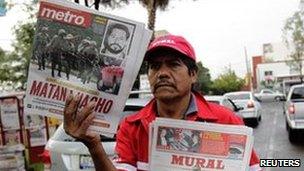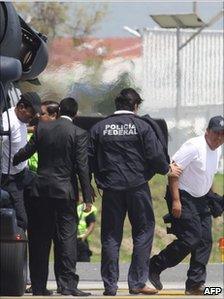Drugs war puts Mexico media in line of fire
- Published

Major news hits the front pages but many incidents are going unreported, journalists say
"You know this person is a murderer - you know he is responsible for the death of this other guy," says Mexican writer Javier Valdez.
"You know it happened at midday, in a central location, in front of a crowd and near a police patrol that just happened to leave the scene precisely at the time of the killing.
"And yet you cannot publish it."
Mr Valdez was describing the challenges he and his colleagues face when reporting drug-related violence in the western state of Sinaloa.
His experience is shared by journalists working in the most violent states of Mexico under the watchful eye of the drug cartels.
Mr Valdez admits that he often publishes only part of the stories he covers.
"We just have to resign ourselves to doing that," he said.
The unwritten rules of journalism in his city of Culiacan mean that some names do not appear in reports.
"Impunity prevails here and that favours certain people who could in turn threaten you, question you or even kill you," Mr Valdez said.
These threats are far from empty.
Human rights groups say that Mexico is one of the world's most dangerous countries for reporters.
More than 30 journalists have been killed or disappeared since President Felipe Calderon came to power in December 2006 and launched his crackdown on the cartels, according to the New York-based Committee to Protect Journalists.
Ethical dilemma
The dangers facing the Mexican media hit the headlines last month when two reporters and two cameramen were kidnapped.

The latest kidnapping - and rescue - of journalists highlighted the dangers
Their seizure, reportedly by members of the Sinaloa drug cartel, posed an ethical dilemma for newsrooms.
The kidnappers demanded that the media broadcast videos supposedly showing ties between the local police and a rival drug gang, the Zetas - some outlets obliged.
Two of the men were subsequently rescued and the other two released.
Local newsrooms, particularly in the northern states where much of the drug-trafficking is concentrated, have lived with the threat from the gangs for years.
"It's not new, but it is serious," said Raul Trejo Delarbre, president of the Mexican Association for the Right to Information.
"On this occasion the kidnapping generated more reactions and statements than usual," he said, partly because it involved national media and journalists from Mexico City.
Faced with the dangers, reporters have been finding their own ways of coping.
Diego Osorno says he has a colleague who first writes his story as he thinks best, with nothing left out
"Then he keeps that text to himself and writes a second version, this time to be published, complying with the censorship stemming from organised crime."
Mr Osorno works for a national newspaper and reports frequently from different parts of the country.
Last year, while reporting from the state of Tamaulipas, considered by many as the most dangerous for journalists in Mexico, he was struck by the "reigning terrifying silence" imposed on reporters.
Tamaulipas has been the scene of a fierce battle between the Zetas and their former allies in the Gulf Cartel as they vie to control key trafficking routes into the US.
According to Mr Osorno, fear has forced the local media to omit any mention of many violent incidents, casualties and killings.
Rules of engagement
The degree of violence and the ways of exerting violence vary from region to region.
Each area has its own unspoken "rules of engagement", defined largely by the modus operandi of the different drug cartels.
"As a reporter you have to know the environment yor are working in," explains Sinaloa-based Javier Valdez, who has recently published two books about drug-trafficking.
In the border city of Ciudad Juarez, considered one of the most dangerous in the world, a local journalist's comments show that risk can be a matter of perception.
"Here is not as bad as in Tamaulipas," said the reporter, who asked not to be named.
The federation of Mexican journalist associations has just recommended the use of body armour and helmets for reporters working in the state of Chihuahua, where Ciudad Juarez is located.
This follows several attacks on media workers by drug cartels.
"I am aware, sometimes, that my life might be at risk, but not to the point that it stops me from doing my job," said the reporter, who has praise for her Ciudad Juarez colleagues and their commitment to their profession.
But many think violence is having an impact on Mexican journalism.
"You end up self-censoring your work," said Mr Valdez.
"When you are writing a story you are no longer thinking about the information, or about your editor, or the director of your company or even the reader.
"You think about the narco, the drug leader, and whether the narco is going to like your story or whether he is going to get upset and take it against you."
And if the story is strong, it is often published without a byline.
"They have put an end to the joy of seeing a good story with your name on it," he said.